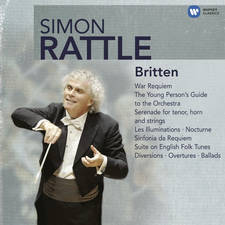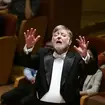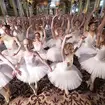The Full Works Concert - Friday 26 July: A Feel-Good Friday
To celebrate the start of the weekend, Jane Jones offers two hours of fun, upbeat music to put you in a good mood.
Why not get into the right mood for the weekend with Jane's selection tonight of colourful, upbeat classics?
Jane kicks off tonight with Mozart's A Musical Joke - and the playful Wolfgang was certainly having a laugh when he wrote it. It's full of wrong notes and flies in the face of all the accepted rules of composition and harmony. But it's by no means easy to play - good players find it harder to hit the wrong notes than the right ones! It's played very brilliantly - or is that very badly? - tonight by the English Concert conducted by Andrew Manze.
Admired by Tchaikovsky among other great composers, Litolff - known as the English Liszt - had a hectic career which is reflected in his works which are formidably difficult. His Concerto Sinfonique No.3 in E flat major was the most popular in Litolff's lifetime and was written for performance in the Netherlands. It uses two popular Dutch melodies which no doubt explains why its first audiences loved it. The music is blisteringly energetic requiring dazzling technique from the pianist.
Aaron Copland wrote Rodeo in 1942 when the American choreographer Agnes de Mille asked him to write music for a new ballet set on a ranch. Having already composed Billy the Kid four years earlier, Copland was reluctant to accept another wild west ballet commission. But de Mille persuaded him by promising that her work would strike a different tone than Billy. Rodeo tells the simple story of a cowgirl who competes for the attention of young ranch hands. Her search for romance culminates at a Saturday night barn dance, where she finally gains a suitor. Rodeo was an instant hit and Copland adapted a concert suite of four dances from his ballet score which has remained a popular concert piece ever since.
When Saint-Saëns composed his Carnival of the Animals early in 1886, he had no intention of making the work public - it was just a trifle he conjured up for friends. Following the first private performance, the work was given again at the request of Saint-Saëns's old friend Liszt, and then Saint-Saëns specifically prohibited further performances of it until after his own death, excepting only the beautiful piece for cello, The Swan. The public premiere took place on February 26, 1922, a little more than two months after the composer's death, and The Carnival of the Animals quickly became - and has remained - one of Saint-Saëns's most popular works.
Finally tonight Marquez's Danzon No.2 for orchestra - probably the most popular piece of Mexican contemporary classical music. The Danzon has its origins in Cuba but is a very important part of the folklore of the Mexican state of Veracruz. Marquez got his inspiration for the piece while visiting a ballroom in Veracruz.
Wolfgang Amadeus Mozart: A Musical Joke
Andrew Manze conducts the English Concert
Henry Litolff: Concerto Sinfonique No.3 in E flat major
Piano: Michael Ponti
Volker Schmidt-Gertenbach conducts the Berlin Symphony Orchestra
Aaron Copland: Rodeo – 4 Dance Episodes
Michael Tilson Thomas conducts the San Francisco Symphony Orchestra
Camille Saint-Saens: Carnival of the Animals
Pianos: Pascal Roge, Cristina Ortiz
Charles Dutoit conducts the London Sinfonietta
Arturo Marquez: Danzon No.2
Gustavo Dudamel conducts the Simon Bolivar Youth Orchestra of Venezuela













